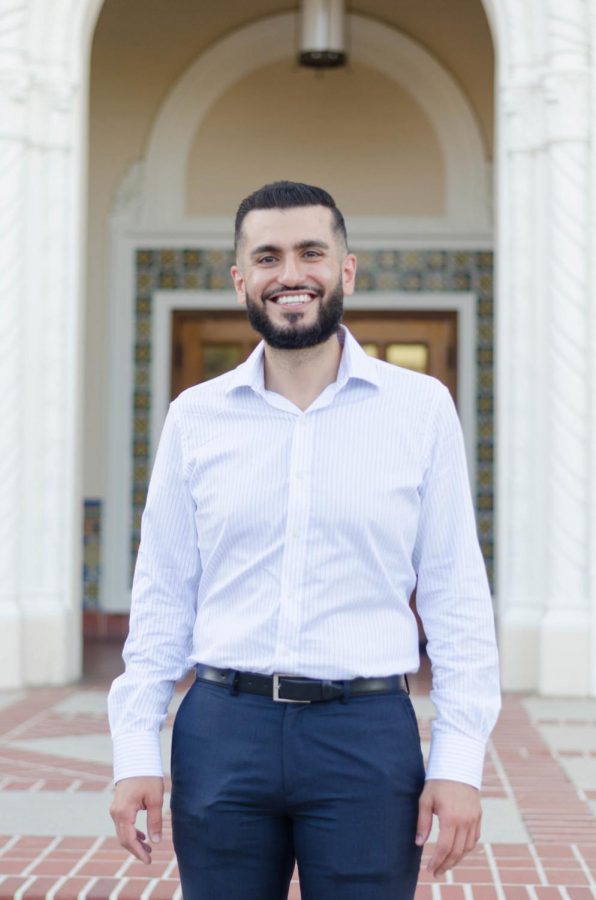Fresh Success: More Help for Struggling Students
Manager of aid programs details what’s available now and in near future
Andre Manukyan, the interim program manager for CARES and Fresh Success.
The manager of programs to assist economically stressed Glendale Community College students says the pandemic has put more students in need of help with food, housing and other basic needs, even as newly approved rent assistance becomes available.
Andre Manukyan, interim program manager for the school’s Center for Assistance, Resources and Educational Success, said that, before the pandemic, one in seven GCC students considered themselves housing insecure, and one in three didn’t have enough food during the previous 30 days.
During COVID, the basic-needs crisis has grown, and so has the response from the school and government. Fresh Success, a novel federal program administered through CARES, was created in February to alleviate basic-needs and housing insecurities of low-income students.
“I saw that as soon as COVID happened, students were leaving GCC for reasons that were avoidable. The idea that someone would give up their future educational and career goals for something that we can sometimes easily fix is troublesome. This program is our first of many in future years of programs that would address basic needs insecurities,” he said.
Fresh Success is funded by the U.S. Department of Agriculture and the Foundation of California Community Colleges to help pay for basic needs, other than food, for community college students who receive CalFresh (food stamps).
Last month, the city of Glendale approved a $1.3 million grant for a Low Income Student Rental Assistance Program, which added the critical housing component within CARES for some low-income GCC students.
When Fresh Success launched, demand was high. Students must be enrolled in classes in Spring 2021 and be in Extended Opportunity Programs and Services, receiving CalFresh benefits, and taking at least one ESL class or class for a career certificate program. For rent assistance (since renamed Sheltered Success), the student must be low-income and reside in Glendale. The federal government and the city of Glendale imposed other restrictions, although Manukyan said he hopes to make the program more inclusive as it develops.
He was asked about other intricacies in the aid programs.
Why was involvement in EOPS made one of the qualifying criteria?
“That’s not always going to be the case. Because this program is brand new, we’re building out the infrastructure as we’re rolling it out. The federal government requires [Fresh Success] students to have case management at least three times a semester. The EOPS program already requires that students do three counseling meetings a semester. [Those meetings] automatically meet the federal government’s requirements.”
However, Manukyan’s goal is to allow Fresh Success to include low-income students not in EOPS or who do not qualify for any Federal Student Aid (FAFSA).
Since the LISRAP funds are meant only for students living in Glendale, where does that leave those who live elsewhere?
“When we support you with LISRAP funding, the federal government then reimburses us a portion of that funding. That [reimbursement] funding is now unrestricted to use to support the housing insecurities of students living outside of Glendale.”
Returning to Fresh Success, what classes count under a “career certificate program,” and why is that necessary?
“The purpose of creating Fresh Success was to give CalFresh recipients case management, basic-needs support and employability training, so they can get a job after they leave GCC; therefore, the USDA has certain requirements. The student needs to remain on CalFresh for the entirety of the year, and every month we check that. Then, there needs to be assessment for future employability, case management with a counselor, and they need to be taking courses that lead to employability. Any sort of basic-skills courses would qualify, like language [including ESL] or any career and technical education courses. There are federal guidelines for what qualifies for those courses. It can get complicated, but you should qualify if your goal is to be employed or to obtain a job after GCC.”
How will the aid be disbursed to students?
“In mid-March, we will be sending out email instructions. Most likely, we will provide Target gift cards for hygiene products, which students will pick up, and send us a receipt with their ID number.” Later down the line, the support might be in the form of gas cards, bus passes, parking passes and things of that nature.
Sheltered Success, providing help with rent, requires a separate application, and will be launched within weeks. The support can come in many forms, either as unmet rent money that would be paid directly to one’s landlord, an emergency stay at a hotel or access to subsidized rent. Finally, there will be special emergency grants to help students with medical bills or textbooks, and those will be funded by donations.
How quickly was Fresh Success filled, and are there any openings?
“The goal of Fresh Success was to enroll 250 students. We’ve already got about 500 students interested from the credit campus alone, and we haven’t done noncredit or credit general non-EOPS. There’s a lot more interest than we initially planned for. We may be putting in an emergency request to the federal government to amend our budget for the grant and request additional funding.”
“People are ashamed to talk about [basic-needs insecurity], or there’s stigma, but that’s always been an issue at GCC and other community colleges” and the pandemic has only made the situation worse, Manukyan said. “Hopefully, this will be a model for other community colleges and show the federal government that when they provide that level of support, students are more likely to stick through school.”
Manifa Baghomian can be reached at [email protected].


